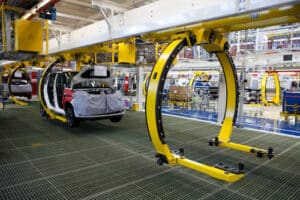Automotive Industry Automation

Automotive Industry Automation
The competition in the Automotive Industry Automation is also increasing as the number of cars on the road increases. Each automaker wants to produce more cars. In 2019, nearly 92 millions automobiles were produced globally. With so many automobiles being produced, manufacturing mistakes are more likely. How can an automaker solve this problem?
Machine vision is the answer.
In the highly automated automobile industry, machine vision is essential. A recent report estimates that the global machine-vision market will reach $31.1 billion in 2024. The report indicates that machine vision in the auto industry will be a major growth driver.
What is the Importance of Machine Vision in the Automotive Industry?
Automotive Industry Automation is now the focus of most industries. The goal is improving manufacturing processes while reducing the amount of manual labor. How does machine vision contribute to this goal?
It adds flexibility to the robots. robots are limited to performing the same tasks repeatedly when there is no variation. However, robots equipped with machine vision cameras can account for variations in applications–such as varying part orientations–allowing applications such as random bin selection.
Machine vision allows for extremely accurate inspections. This is another (and perhaps even bigger) reason why machine vision is so important. Inspection standards are high to meet the high requirements for accuracy and quality in automobiles. Each car has approximately 30,000 components, including the smallest screws and plates. They must all fit perfectly and work flawlessly. These 30,000 parts can cause serious damage to the car and be costly to the manufacturer if they have any defects. These parts can be inspected for defects by machine vision systems much more efficiently than humans.
Applications of Machine Vision in the Auto Industry
You’ve probably already figured out the importance of machine vision in the automotive sector. How can automakers use it? How can it help to produce better-quality cars? Look at its application:
- Automated bin picking: Automakers have to deal with an enormous number of vehicle components. Bins are commonly used to store these parts. Bins are often used to store more than one item. Sorting these parts takes a lot of time. Many automakers found it difficult to understand the idea of automating the process, since machines could pick up any part from a bin at random. This required regular monitoring. With machine vision, the process can be completed within seconds. A machine-vision system can detect and sort even the smallest auto parts using pattern recognition. It will also record the whole process for future use.
- Welding Defect DetectionWelding defects cannot be detected with the naked eyes. Machine vision can detect them. Pattern recognition can be used to detect welding defects by a machine vision-driven technology. The system compares the welding images with database images, and sorts them as “correct alignment” (correct alignment) or “incorrect alignement”. Parts that fall in to the latter group are rejected.
- Gauging Inspect: Gauging Inspection is another machine vision technique used in the automotive industry. A machine vision system can quickly inspect the dimensions of parts. The system is able to calculate the volume for parts like brake valves and pistons. It can also scan glue head placements to determine if the space dimensions are in compliance.
- Metal stamping inspection: Machine Vision also helps automakers to identify the shape and size stamped parts, inspecting vehicle identification numbers (VIN), and tracking engine block.
- Inspection of Electronic Components: Machine Vision can be used to inspect electronic components placed in automobiles. It can scan and detect the placement of various parts, such as printed circuit boards (PCBs), module seals, cooling units, switch assemblies and other components.
- Safety parts detection: The safety component of a car defines the level of security it provides. The precise placement of safety parts is therefore crucial. The inspection of safety parts such as airbag components, fabric and components, brake pads and valves, torque converters, engine valves, etc. can be done using machine vision.
- Testing for Powertrain Manufacturing: The parts of a vehicle that provide power are referred to as the “powertrain.” In simple words, the powertrain is what moves an automobile–therefore, the mechanical functionality of an automobile is dependent on this assembly. Improper assembly can lead to unexpected vehicle breakdowns and other problems. The use of machine vision is used to inspect steering wheel knuckles prior to module assembly, analyze and inspect camshafts, test the proper placement of pistons in cylinder blocks and other tasks.
- Performance Analyses: It’s important to inspect and assemble the correct parts. It is important to test the performance of these parts. Machine vision provides accurate results in terms of vehicle performance. It examines the battery, motor and power electronics systems.
Let SUPERIOR OPTICAL ’s lens application engineers supply you with the best lens solution.
SUPERIOR OPTICAL has a highly skilled engineering team capable of designing and manufacturing optical lens assemblies for many robotic and machine vision system applications. If you need premium custom lenses to boost the efficiency and profitability of your automotive manufacturing operations, please get in touch with us at info@superiorcctv.com. One of our trained lens application engineers will get back to you as soon as possible.
Related Posts
Industrial Robotics And Machine Vision In The Auto Industry
How useful was this post? Click on a star to rate it! Submit Rating As you found this post useful......
Commercial Vehicle Surveillance System
How useful was this post? Click on a star to rate it! Submit Rating As you found this post useful......




